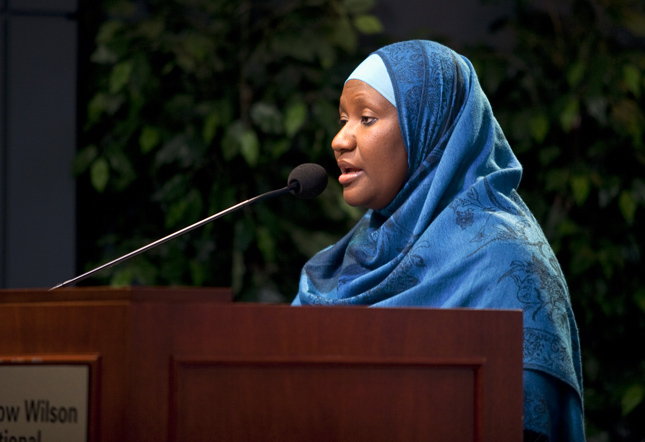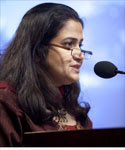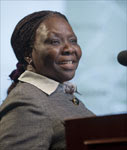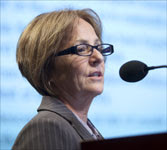-
Family Planning in Fragile States
May 3, 2010 By Calyn Ostrowski
“Conflict-affected countries have some of the worst reproductive health indicators,” said Saundra Krause of the Women’s Refugee Commission at a recent Wilson Center event. “Pregnant women may deliver on the roadside or in makeshift shelters, no longer able to access whatever delivery plans they had. People fleeing their homes may have forgotten or left behind condoms and birth control methods.”
Yet supplying sexual and reproductive health services is often an afterthought in the rebuilding or post-conflict period. Patriarchal attitudes and negative cultural norms may further decrease the availability of family planning services, explained three OB/GYNs from fragile states – Dr. Karima Tunau of Nigeria, Dr. Nabila Malick of Pakistan, and Dr. Grace Kodindo of Chad.
Meeting Reproductive Health Needs in Nigeria
Nigeria has one of the highest rates of maternal mortality in the world. In the northwest state of Sokoto, where Dr. Tunau works at Usmanu Hospital, maternal death rates in 2005 were three times higher than in the rest of the country. Through an innovative financial scheme, the Sokoto region reduced maternal death rates by half in just four years.
“We set up an emergency fund that would pay for the care of any woman who came to our center during pregnancy and labor,” said Dr. Tunau. Access to commodities such as birth control pills, condoms, and injectable methods (e.g., Depo-Provera) are typically secured through Nigeria’s Ministry of Health. However, “many months have gone by and we have not received any contraceptives from them,” said Dr. Tunau. “When contraceptives are not available it discourages our clients from returning to our clinic and creates a negative image within the community.” To resolve this issue, Dr. Tunau established a fund that purchases supplies directly from vendors when the Ministry of Health cannot provide them.
Women and Youth: Overcoming Cultural Barriers in Pakistan
 “War or no war, my line of duty requires that we are there for the ones who need reproductive health services. In fact, the conflict situation has made these services even more crucial,” said Dr. Malick, who is the director of advocacy for Pakistan’s Rahnuma Family Planning Association.
“War or no war, my line of duty requires that we are there for the ones who need reproductive health services. In fact, the conflict situation has made these services even more crucial,” said Dr. Malick, who is the director of advocacy for Pakistan’s Rahnuma Family Planning Association.“Mothers die because there are no services for the poor, because the women are victims of brutal customs…because women are not valued; because women are not educated. Women’s lives are valued so low that in villages you will find men who are willing to spend money on their livestock but not on their wives,” said Dr. Malick.
“The problems are enormous but not insurmountable,” said Dr. Malick. Her pioneering organization, Rahnuma Family Planning Association of Pakistan, brings mobile health clinics to villages that do not readily have access to maternal health care. Women’s empowerment programs include skill building and male engagement, “because leaving men out does not work,” said Dr. Malick. She encouraged donors to support family planning and maternal health services that strategically integrate men, youth, and female empowerment. She also called upon policymakers to permanently remove the Mexico City Policy, or global gag rule.
Advocating for Improved Status of Women in Chad
 Chad has witnessed civil conflict and political instability since 1968, and in this perpetual fragile condition, “reproductive health services are not a priority,” said Dr. Kodindo, who is currently a professor at Columbia University.
Chad has witnessed civil conflict and political instability since 1968, and in this perpetual fragile condition, “reproductive health services are not a priority,” said Dr. Kodindo, who is currently a professor at Columbia University.“Chad is a pro-natalist country…and in the beginning the government was so afraid of using the term family planning because to them it was linked with family limitation, so they preferred to use [the term] family well-being,” said Dr. Kodindo. Cultural traditions in Chad permit contraception use for birth spacing but not as a way to prevent unwanted pregnancies and emergency obstetric complications. “The status of women used to be valued by the number of children you have – especially boys – the more [children] you have, the more you are valued in the family,” she said. However, these cultural practices are changing.
Funds for reproductive and maternal health care in Chad are limited and primarily provided by the United Nations Population Fund. Funding from other donor agencies, such as USAID, is essential to empowering women in fragile countries because it demonstrates to the host government “that a woman’s life and health is important… and should be made a priority,” said Dr. Kodindo.
Implementing Family Planning Policies Require Funding
 During a conflict, health systems are destroyed and logistical supply chains are often damaged, creating both immediate and long-term problems. While there are standards and polices for responding to refugees’ reproductive health needs, such as Reproductive Health in Humanitarian Settings: An Inter-agency Field Manual and Health Cluster Guide, the implementation of these action plans often faces huge bottlenecks, said Krause, the director of the Women’s Refugee Committee’s Reproductive Health Program.
During a conflict, health systems are destroyed and logistical supply chains are often damaged, creating both immediate and long-term problems. While there are standards and polices for responding to refugees’ reproductive health needs, such as Reproductive Health in Humanitarian Settings: An Inter-agency Field Manual and Health Cluster Guide, the implementation of these action plans often faces huge bottlenecks, said Krause, the director of the Women’s Refugee Committee’s Reproductive Health Program.In a study conducted by the RAISE Initiative, only 15 percent of UN agency, private donor, and government policies referred to comprehensive reproductive health in emergency settings. “This approach is fragmented and does not complement the holistic comprehensive approach of ICPD that is important for us to achieve the Millennium Development Goals,” said Krause.
“Policies and funding should support existing guidelines and standards,” said Krause. The recommendations offered in the guidelines “should be fully integrated into any broader health proposals such as Obama’s Global Health Initiative,” she said. By integrating services and working across sectors, funding for reproductive health services in fragile states can fill the transition gap from relief to long-term development.
 A Publication of the Stimson Center.
A Publication of the Stimson Center.






